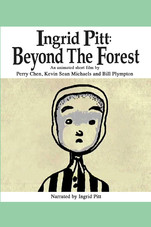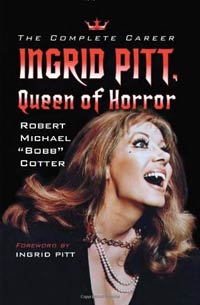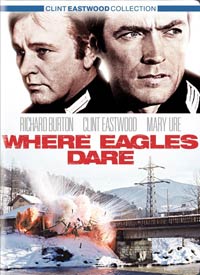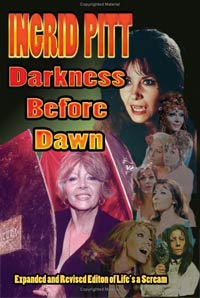Ingrid Pitt: Beyond The Forest
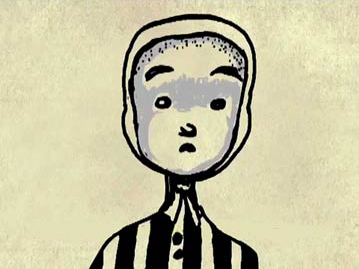
An animated short film by Perry Chen, Kevin Sean Michaels and Bill Plympton
Narrated by Ingrid Pitt
New! Now available on iTunes for download
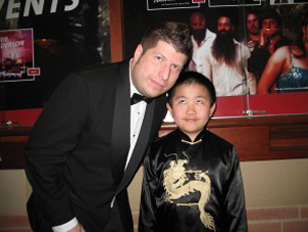
About the short film
Memories from the Holocaust have been portrayed in almost every medium, but rarely animation -- and never before by a child animator. Animated short film "INGRID PITT: BEYOND THE FOREST" is a cross-generational collaboration between a world-class animation master, two-time Academy Award-nominated Bill Plympton, and a first-time animator, 11-year-old artist Perry Chen. It is narrated by Ingrid Pitt herself.
Starting with Ingrid Pitt's poignant narration and Bill Plympton's 23 traditional pencil sketches as storyboard, award-winning artist and film critic Perry Chen brings this moving story and its contemporary implications alive. Read more
Support the short!
Who is Ingrid Pitt?
By Robert Michael "Bobb" Cotter,
author of Ingrid Pitt, Queen of Horror: The Complete Career (McFarland & Co.)
This world lost Ingrid Pitt on November 23rd, 2010, and it lost so much more than the cinema's most famous female vampire, it lost a woman whose life could have been a film in itself. Movie fans knew Ingrid as an indelible screen presence, with a devotion to those fans matched only by their devotion to her. Those fans call her "The Queen of Horror," a title which she would personally dispute, yet fully embrace -- as much as she would embrace the role her family knew her best for, which was that of a loving wife, mother, and grandmother. She is one of the most beloved figures of cult cinema, but what is it about her that inspires such a devoted fan base? Hers is the archetypal rags-to-riches story, yet what makes her story different is not simply the riches she earned as a result of her fame, but the riches of understanding of the human condition. And so, while there is the artifice of celebrity, behind it all was a very real person which kept the artifice from ever truly becoming artificial. But, as we shall see, it really never could have been any other way. Because for every action there is a reaction, and Ingrid's actions and reactions, both right and wrong, shaped her life -- a life which nothing in the artifice indicated her incredible struggle, every step of the way, to achieve it.
Born in Poland in 1937, Ingrid decided very early in her life that she wanted to be an actress, although it was admittedly her second choice as a career; after enduring a childhood no child should have to endure, she wanted to be a doctor, to help alleviate others' suffering. But that dream would soon give way to another, that of becoming an actress, a career that alleviates suffering in a different manner.
Ingrid only appeared in the play Mother Courage and her Children before escaping from East Berlin to West. This incident not only gave Ingrid her freedom from Communist oppression (by jumping into and swimming the river which separated the divided Germany), but her first marriage and her stage name as well -- she ended up marrying the soldier, named Pitt, who pulled her from the river. But marriages made in Heaven often go sour in this life. She left Major Pitt when he went to Vietnam, a war which, like all other wars, she was vehemently against.
After this, she settled in Spain, where she would do her first film work. Spain was where her career started in earnest, with roles in both television and movies, which included her first appearance in the genre for which she would become most famous, a movie called The Sound of Horror. She then appeared as an extra in Orson Welles' Falstaff, Doctor Zhivago and A Funny Thing Happened on the Way to the Forum as well as the independent The Omegans, and seemed destined for bigger and better things, a destiny which would soon manifest itself as a featured role in Where Eagles Dare.
She had moved to America for a screen test for Fox. Her first job was a part in an episode of John Mills' summer-replacement series, Dundee and the Culhane, where she met Ralph Meeker, who also had a guest role in the show. In the course of a poker game, she met director Brian Hutton, and he cast Ingrid in the film Where Eagles Dare.
Ingrid appeared to be on the brink of A-List Hollywood success with her appearance in Where Eagles Dare, and the fact that she didn't achieve it can be attributed to both bad luck and mistakes in personal judgment, to which she readily admitted. She turned down roles on television, because she thought she was going to be a major film star. But she found that even that was not all it was cracked up to be; making her first big film was a traumatizing experience. Not only did being on the set of a World War II movie bring back nightmarish memories, but insult was added to injury when the producers staged a party for the film that featured a Hitler impersonator. Ingrid left in tears. She tried to do more television, but as Michael Caine said, "You always say yes, because if you say no, they don't ask you anymore." Ingrid had said no, and they didn't.
Although Ingrid found starring roles in Britain's Hammer Films, and of course, the rest is history -- but it is a history that might have been vastly different if not for her second marriage. With The Vampire Lovers and Countess Dracula; it looked as though once again she seemed set to take her place as a force to be reckoned with, but again, it was not to be. For at the height of her success, and in the prime of her career, she almost disappeared from the screen for a decade, except for small roles in The Wicker Man, The House that Dripped Blood and assorted television shows, like Jason King, The Zoo Gang, and The Adventurer.
This is because, in another instance of bad judgment, with far more serious implications, she secretly married a man named George Pinches, a booker for the ultra-powerful Rank Organisation cinema chain. He suggested this when Ingrid was going to be deported, telling her that they could maintain a platonic relationship, but, according to Ingrid, this changed as soon as they got married, and only got worse with time; he effectively blacklisted her, an embargo that was only lifted with his removal from the industry. She had found her niche, only to be stymied again.
But, as always, the word "quit" was not in her extensive vocabulary. She met Tony Rudlin, and they moved to Argentina for a few years, in the process becoming friends with Juan Peron. But her happiness there didn't last long, as they had to leave the country due to political unrest. When she returned to England, she also returned to the stage, in Dial M for Murder, but her career was once again put on hold when it was discovered she had ovarian cancer.
In the 1980's, Ingrid also experienced a resurgence in her film career, with parts in films like Wild Geese II, Parker, Who Dares Wins, and Hanna's War; not leading parts, true, but she was once again a working actress. In 1986, she lost her mother, without whom she never would have survived in the first place.
She also began a new career, that of an author. In addition to books of both fact (her autobiography, Darkness Before Dawn) and fiction, she penned innumerable articles for all sorts of magazines on a wide-ranging field of topics; everything from horror to cricket. In the 90's, she also became a fixture of the convention circuit, and delighted fans for years with her appearances at Fanex, Chiller Theatre, and many others. Little did they know of the pain behind the smiles, for she had now undergone treatment for breast cancer as well.
She was in even higher demand as the new millennium dawned, for now some of those fans had become professionals, and so the children that grew up loving her had now grown up and wanted to work with the woman who had inspired them. But more often than not, they were disappointed, because her increasing health-related issues limited her ability to work, although never her enthusiasm. Still, she managed to appear in films like Minotaur and a dream project which enabled her to appear with her daughter Steffanie, The Asylum. Her last film was 2006's Sea of Dust, a Hammer Films tribute that also carried strong anti-authoritarian overtones, which was one of the main reasons Ingrid wanted to do the film; because of the childhood that no child should have to endure, she never could really have felt any other way - because Ingrid Pitt grew up in a concentration camp.
In a way, it was supremely ironic that she would be dubbed "The Queen of Horror," because Ingrid Pitt survived the greatest horror of all -- the Holocaust. She lived it every day for years from the age of three, when the Nazis overran Poland. Her child's eyes saw the degradation, the torture, and the killings. She could have been one of its countless victims, but she survived, which would set the course for her entire life and career -- a career in which she would, again ironically, die many times. It was a career for which she was uniquely suited -- Ingrid Pitt was the Queen of Horror because she had known real horror. It was the reason films like Where Eagles Dare and Hanna's War were so difficult for her to endure -- what was play-acting for others was an everyday reminder of that horror.
And that is what makes Ingrid, and her career, different, and that is why we care -- because she is one of us. No child of privilege, no silver spoon-fed upbringing; like most people, she had to fight for every step of ground she gained while constantly being knocked two steps back. For every Mother Courage, there was Communist oppression, for every Where Eagles Dare there were painful memories, for every Countess Dracula there was a George Pinches; for the joyous pain of childbirth, the debilitating pain of cancers.
She escaped the horrors of the concentration camp to provide escapism for others, letting others experience vicariously what had been, for her, an everyday occurrence. But it was a career that never would have happened without her will to live, and the will to live life to its fullest, the consequences be damned. And that was her life as well as her career -- no matter what she did, she did it her way, the consequences be damned, right or wrong. She survived not only the Holocaust, but breast cancer, ovarian cancer, and other illnesses, until she succumbed as all humans must -- but before she did, she became a legend.
© 2011 Robert Michael "Bobb" Cotter
Used by permission.
